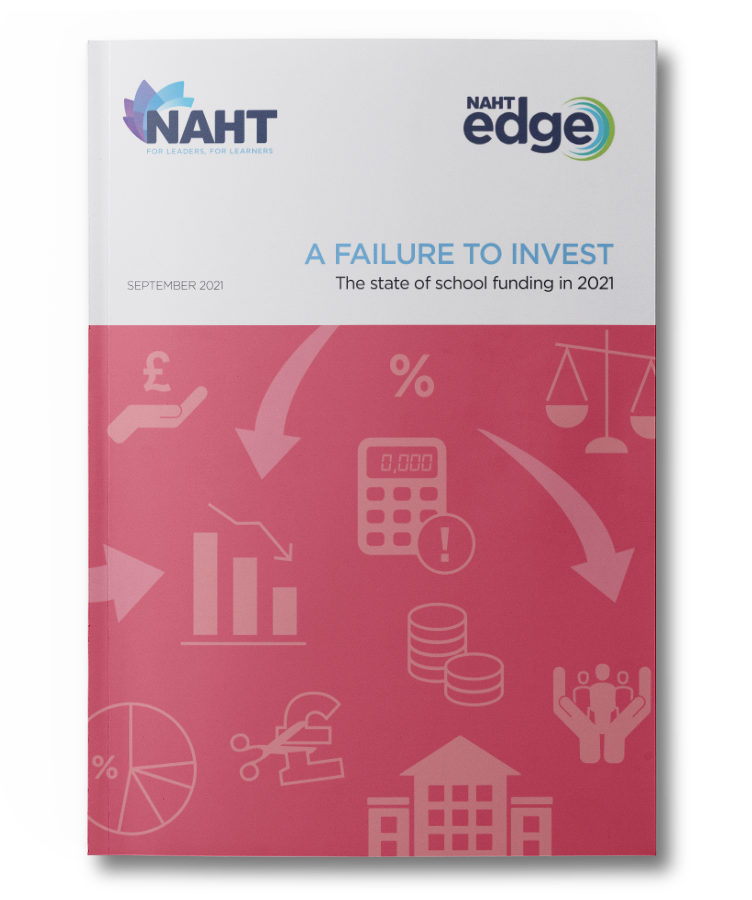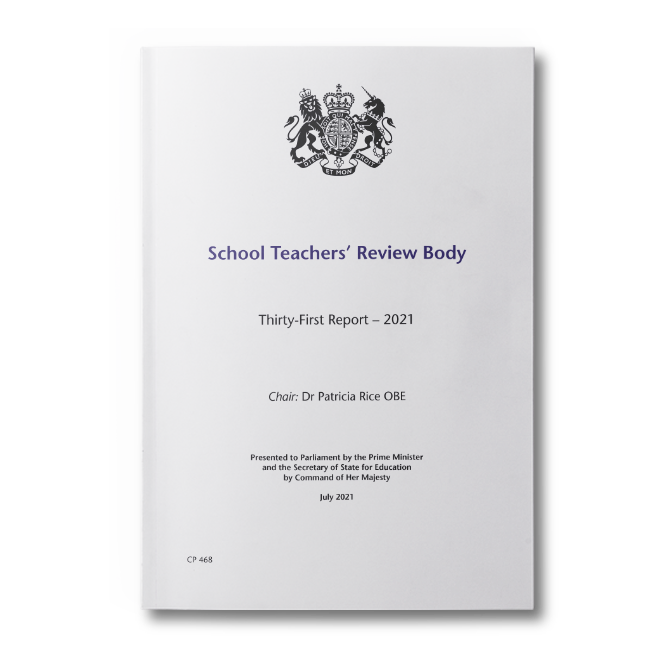
Leadership Focus journalist Nic Paton looks at the issue of pay for teachers and school leaders and the need for a longer-term review of the pay system itself.
If you’re a glass-half-full person, the fact this year’s pay negotiations are following on from 2021/22’s pay freeze means they will be starting from such a low bar that things, surely, can only go upwards? Of course, if you’re more glass-half-empty, the fact the government had no compunction about imposing a pay freeze during perhaps the most challenging year teachers and senior leaders will ever have experienced doesn’t exactly bode well for the future.
Nevertheless, NAHT rolled up its sleeves over the autumn and, as usual, has been making a firm and evidenced case to the School Teachers’ Review Body (STRB) for a considerably warmer pay settlement for next year, as its response to the statutory consultation on the STRB’s 31st remit report shows.

IAN HARTWRIGHT,
NAHT SENIOR POLICY ADVISOR
“We think the STRB could take an interim position, where it says, ‘right, we think what teaching needs is a three-year pay deal to recover the real value of teachers and leaders’ salaries from 2009/10’. That would, we recognise, be a massive win.
“However, we also feel that would be a good staging post to then allow the STRB to carry out a wider concurrent review of the pay of teachers and leaders, which previously it has said has been too much to do at the same time because it is too complex and too much work. We also want to press the STRB that this is something it should do in conjunction with statutory consultees, such as unions. We need to be looking at a really thorough process of engagement and consultation,” he adds.
Teaching is, of course, a people-heavy profession, and pay is normally the biggest chunk of most schools’ budgets. Therefore, education’s deepening funding crisis provides added urgency to this year’s pay round negotiations, with NAHT’s new funding campaign examined in more depth elsewhere within Leadership Focus.
As NAHT’s latest funding report, ‘A failure to invest: the state of school funding in 2021’, makes all too clear, unfunded increased employment costs are a key financial stress for many schools, with changes such as next year’s extra levy on national insurance to pay for increased NHS and social care costs only likely to exacerbate things further.

PAUL WHITEMAN,
NAHT GENERAL SECRETARY
“We have to accept that actually the biggest cost for education is people because it is a people business. We need the very best talent we can possibly get hold of, and we need to retain that talent as well,” he says.
“It is also about raising the status of the profession. Teachers and school leaders stood up and delivered everything that was asked of them during the pandemic and more. So, let’s rebuild the dignity, attractiveness and reputation of the profession; one way to do that is through recognising that both teachers and senior leaders need to be properly remunerated,” he adds.
One challenge for this year, although also a potential opportunity, is that the hugely experienced STRB chair Dr Patricia Rice, a senior research fellow in labour economics at Oxford University, stood down in September and was replaced by an HR professional from the banking sector, Dr Mike Aldred.
During Rice’s tenure, the review body has guarded its independence, requesting wider remits to allow it to consider systemic issues in the pay system. This year’s report was unequivocal, urging that it “be allowed to exercise [its] role fully in making recommendations on pay uplifts for all teachers and school leaders for 2022/23” and stating that a continuation of the pay freeze “risks a severe negative impact on the competitive position of the teaching profession, jeopardising efforts to attract and retain the high-quality graduates necessary to deliver improved pupil outcomes”.
While the change of chair will mean, on the one hand, there will need to be a learning and getting-to-know-you process on both sides, as Ian points out, it also potentially offers an opportunity to build on the solid body of evidence that the STRB has already built up, including its clear finding that a review of the leadership scale should be included in the next remit.
“We have an opportunity to set out the landscape for him and show him where we are. We want to look him in the eye and be able to say, ‘we know what the problem is here; don’t pretend it’s something else’ but also be helpful and constructive,” Ian says.




If you’re a glass-half-full person, the fact this year’s pay negotiations are following on from 2021/22’s pay freeze means they will be starting from such a low bar that things, surely, can only go upwards? Of course, if you’re more glass-half-empty, the fact the government had no compunction about imposing a pay freeze during perhaps the most challenging year teachers and senior leaders will ever have experienced doesn’t exactly bode well for the future.
Nevertheless, NAHT rolled up its sleeves over the autumn and, as usual, has been making a firm and evidenced case to the School Teachers’ Review Body (STRB) for a considerably warmer pay settlement for next year, as its response to the statutory consultation on the STRB’s 31st remit report shows.

IAN HARTWRIGHT,
NAHT SENIOR POLICY ADVISOR
“We think the STRB could take an interim position, where it says, ‘right, we think what teaching needs is a three-year pay deal to recover the real value of teachers and leaders’ salaries from 2009/10’. That would, we recognise, be a massive win.

“However, we also feel that would be a good staging post to then allow the STRB to carry out a wider concurrent review of the pay of teachers and leaders, which previously it has said has been too much to do at the same time because it is too complex and too much work. We also want to press the STRB that this is something it should do in conjunction with statutory consultees, such as unions. We need to be looking at a really thorough process of engagement and consultation,” he adds.
Teaching is, of course, a people-heavy profession, and pay is normally the biggest chunk of most schools’ budgets. Therefore, education’s deepening funding crisis provides added urgency to this year’s pay round negotiations, with NAHT’s new funding campaign examined in more depth elsewhere within Leadership Focus.
As NAHT’s latest funding report, ‘A failure to invest: the state of school funding in 2021’, makes all too clear, unfunded increased employment costs are a key financial stress for many schools, with changes such as next year’s extra levy on national insurance to pay for increased NHS and social care costs only likely to exacerbate things further.

PAUL WHITEMAN,
NAHT GENERAL SECRETARY
“We have to accept that actually the biggest cost for education is people because it is a people business. We need the very best talent we can possibly get hold of, and we need to retain that talent as well,” he says.

“It is also about raising the status of the profession. Teachers and school leaders stood up and delivered everything that was asked of them during the pandemic and more. So, let’s rebuild the dignity, attractiveness and reputation of the profession; one way to do that is through recognising that both teachers and senior leaders need to be properly remunerated,” he adds.
One challenge for this year, although also a potential opportunity, is that the hugely experienced STRB chair Dr Patricia Rice, a senior research fellow in labour economics at Oxford University, stood down in September and was replaced by an HR professional from the banking sector, Dr Mike Aldred.
During Rice’s tenure, the review body has guarded its independence, requesting wider remits to allow it to consider systemic issues in the pay system. This year’s report was unequivocal, urging that it “be allowed to exercise [its] role fully in making recommendations on pay uplifts for all teachers and school leaders for 2022/23” and stating that a continuation of the pay freeze “risks a severe negative impact on the competitive position of the teaching profession, jeopardising efforts to attract and retain the high-quality graduates necessary to deliver improved pupil outcomes”.
While the change of chair will mean, on the one hand, there will need to be a learning and getting-to-know-you process on both sides, as Ian points out, it also potentially offers an opportunity to build on the solid body of evidence that the STRB has already built up, including its clear finding that a review of the leadership scale should be included in the next remit.
“We have an opportunity to set out the landscape for him and show him where we are. We want to look him in the eye and be able to say, ‘we know what the problem is here; don’t pretend it’s something else’ but also be helpful and constructive,” Ian says.
“There is a story here, too, about the improving economy; suddenly, we’re finding ourselves with no workers, or shortages, in various areas, and wages rising – across the whole economy, wages grew by 8.8% between April and June 2021. And there is a huge group of graduates who, perhaps, weren’t able to move forward in the way they wanted to over the last couple of years. On top of everything else, the government needs to be stepping away and letting the STRB do its work; that’s what the purpose of a pay review body is, after all,” Ian adds.
It is, of course, hypothetical, but what if the pay freeze extends for another year? What then? Clearly, anger and frustration are growing in the profession about funding generally, of which pay is just one (if important) part. Could we be on a slope towards industrial action, even strike action, if the profession’s demands are ignored once more?
“If the government extends the pay freeze, what would members be willing to do? That may be a conversation we need to be having, I am sure,” agrees Ian. “To an extent, however, there’s a point where we’ll have to say to members, ‘well, it depends on what you’re prepared to do yourself?’. Is it write to your MP, sign a petition, take action short of strike or take action including strike action? But I think we’re probably a long way off that yet.”
WHAT, THEN, HAS NAHT’S REPORT TO THE STRB THIS YEAR SET OUT?
NAHT has argued strongly for the STRB to be freed from the shackles of the government’s constraints and interference. “It is critical that the next remit allows the STRB to conduct a full analysis of the pay of teachers and leaders, and of the pay system itself,” it says, “and to engage in longer-term consultation over the pay system for both teachers and school leaders, recognising that an effective pay continuum supports both recruitment and retention across the full career range.”
Notwithstanding the government’s “dismally constrained” remit for the STRB, NAHT has recognised the review body “has a detailed and nuanced understanding of the key factors that threaten teacher and leadership supply”.
Indeed, NAHT in its report praises the STRB for the fact it “has consistently highlighted the declining position of teachers and school leaders’ pay and the steadily increasing risk that this poses to the recruitment of graduates and career-changers, the retention of experienced teachers and leaders, and the security of the already much-damaged leadership pipeline”.
The review body’s recognition that a continuing pay freeze is very damaging to the profession “should be a wake-up call for the government”, NAHT argues.
“The recovery in employment and the wider economy during 2021 once again makes pay levels in teaching comparatively unattractive, particularly given the widespread acknowledgement of the huge workload and pressure associated with the role. Few will have looked with envy at school leaders as they struggled to manage the chaotic late instructions and guidance issued as schools attempted to mitigate the effects of the pandemic on their pupils, communities and staff teams,” NAHT highlights.

Therefore, NAHT outlines that it strongly agrees with the review body’s conclusion “that a pay pause for teachers of more than one year risks a severe negative impact on the competitive position of the teaching profession”.
The report also highlights the ongoing leadership drought in schools, with a decline in pay differentials for leadership roles and the fall of the real value of school leaders’ pay, all working to undermine the supply of new leaders and reduce the chances of assistant and deputy heads stepping up.
NAHT, therefore, welcomed the STRB’s call to the government for its next remit to include a review of the leadership scale. “NAHT believes that this is long overdue and agrees with the STRB’s view that this should include: the factors determining pay for school leaders, pay differentials between the teacher and leadership pay ranges, and the question of which leadership roles are covered by the existing pay structure,” NAHT has said.



It is, of course, hypothetical, but what if the pay freeze extends for another year? What then? Clearly, anger and frustration are growing in the profession about funding generally, of which pay is just one (if important) part. Could we be on a slope towards industrial action, even strike action, if the profession’s demands are ignored once more?
“If the government extends the pay freeze, what would members be willing to do? That may be a conversation we need to be having, I am sure,” agrees Ian. “To an extent, however, there’s a point where we’ll have to say to members, ‘well, it depends on what you’re prepared to do yourself?’. Is it write to your MP, sign a petition, take action short of strike or take action including strike action? But I think we’re probably a long way off that yet.”
WHAT, THEN, HAS NAHT’S REPORT TO THE STRB THIS YEAR SET OUT?
NAHT has argued strongly for the STRB to be freed from the shackles of the government’s constraints and interference. “It is critical that the next remit allows the STRB to conduct a full analysis of the pay of teachers and leaders, and of the pay system itself,” it says, “and to engage in longer-term consultation over the pay system for both teachers and school leaders, recognising that an effective pay continuum supports both recruitment and retention across the full career range.”
Notwithstanding the government’s “dismally constrained” remit for the STRB, NAHT has recognised the review body “has a detailed and nuanced understanding of the key factors that threaten teacher and leadership supply”.
Indeed, NAHT in its report praises the STRB for the fact it “has consistently highlighted the declining position of teachers and school leaders’ pay and the steadily increasing risk that this poses to the recruitment of graduates and career-changers, the retention of experienced teachers and leaders, and the security of the already much-damaged leadership pipeline”.
The review body’s recognition that a continuing pay freeze is very damaging to the profession “should be a wake-up call for the government”, NAHT argues.
“The recovery in employment and the wider economy during 2021 once again makes pay levels in teaching comparatively unattractive, particularly given the widespread acknowledgement of the huge workload and pressure associated with the role. Few will have looked with envy at school leaders as they struggled to manage the chaotic late instructions and guidance issued as schools attempted to mitigate the effects of the pandemic on their pupils, communities and staff teams,” NAHT highlights.

Therefore, NAHT outlines that it strongly agrees with the review body’s conclusion “that a pay pause for teachers of more than one year risks a severe negative impact on the competitive position of the teaching profession”.
The report also highlights the ongoing leadership drought in schools, with a decline in pay differentials for leadership roles and the fall of the real value of school leaders’ pay, all working to undermine the supply of new leaders and reduce the chances of assistant and deputy heads stepping up.
NAHT, therefore, welcomed the STRB’s call to the government for its next remit to include a review of the leadership scale. “NAHT believes that this is long overdue and agrees with the STRB’s view that this should include: the factors determining pay for school leaders, pay differentials between the teacher and leadership pay ranges, and the question of which leadership roles are covered by the existing pay structure,” NAHT has said.
VIEW FROM THE NATIONS

LAURA DOEL,
NAHT CYMRU DIRECTOR
There will need to be a significant pay discussion within Wales about the introduction of statutory additional learning needs coordinators (ALNCos) within schools, highlights Laura Doel, NAHT Cymru director.
“As of this year, there has been new legislation that means each school in Wales has to have an ALNCo, a person who heads up support for learners with additional needs,” she points out.
“Because this is a new role, it sits outside the current pay structure; there is no pay scale for ALNCos. What we’re keen to do, therefore, is have those discussions to make sure, firstly, an ALNCo is properly remunerated because it is a senior position within the school and now a statutory position; it also comes with certain qualifications that you have to have as well as legal obligations, so it is quite a responsible role. To make sure schools are attracting the right people for these roles, they also need to have a pay structure that reflects the seniority of the position.
“Secondly, we want to discuss the issue of the remuneration of head teachers who are responsible for more than one school. Increasingly in Wales, we are getting schools that are federated. Normally a number of often rural schools will come together, not physically merged but with a leadership team that sits across maybe three small primary schools, say.
“We don’t have a lot of consistency, and it throws up all sorts of problems. We want to have something in Wales that looks at that,” says Laura.

HELENA MACORMAC,
NAHT(NI) DIRECTOR.
In Northern Ireland, pay talks about this year and next are already underway, with unions jointly calling for a 6% uplift. “That is, we appreciate, quite ambitious, but it is an opening gambit. We’ve also put in a claim for improved maternity, paternity, adoption and assisted pregnancy rights,” says Helena Macormac, NAHT(NI) director.
“We’re hoping that it will be understood, but it is hard to predict,” she adds.
VIEW FROM THE NATIONS

LAURA DOEL,
NAHT CYMRU DIRECTOR
There will need to be a significant pay discussion within Wales about the introduction of statutory additional learning needs coordinators (ALNCos) within schools, highlights Laura Doel, NAHT Cymru director.
“As of this year, there has been new legislation that means each school in Wales has to have an ALNCo, a person who heads up support for learners with additional needs,” she points out.
“Because this is a new role, it sits outside the current pay structure; there is no pay scale for ALNCos. What we’re keen to do, therefore, is have those discussions to make sure, firstly, an ALNCo is properly remunerated because it is a senior position within the school and now a statutory position; it also comes with certain qualifications that you have to have as well as legal obligations, so it is quite a responsible role. To make sure schools are attracting the right people for these roles, they also need to have a pay structure that reflects the seniority of the position.
“Secondly, we want to discuss the issue of the remuneration of head teachers who are responsible for more than one school. Increasingly in Wales, we are getting schools that are federated. Normally a number of often rural schools will come together, not physically merged but with a leadership team that sits across maybe three small primary schools, say.
“We don’t have a lot of consistency, and it throws up all sorts of problems. We want to have something in Wales that looks at that,” says Laura.

HELENA MACORMAC,
NAHT(NI) DIRECTOR.
In Northern Ireland, pay talks about this year and next are already underway, with unions jointly calling for a 6% uplift. “That is, we appreciate, quite ambitious, but it is an opening gambit. We’ve also put in a claim for improved maternity, paternity, adoption and assisted pregnancy rights,” says Helena Macormac, NAHT(NI) director.
“We’re hoping that it will be understood, but it is hard to predict,” she adds.


THE SCHOOL BUSINESS LEADER’S VIEW

RACHEL YOUNGER,
BUSINESS MANAGER AT ST NICHOLAS CHURCH OF ENGLAND PRIMARY SCHOOL IN BLACKPOOL AND CHAIR OF NAHT’S SCHOOL BUSINESS LEADERS’ COUNCIL
School leaders may have a battle on their hands to wrestle out a pay increase. Still, for school business leaders, it feels like they have been bashing their heads against a brick wall for years, argues Rachel Younger, business manager at St Nicholas Church of England Primary School in Blackpool and chair of NAHT’s school business leaders’ (SBLs’) council.
“I know a lot of SBL members worry that we haven’t made much progress; how nothing seems to happen, how they’re on half the salary of their deputy head but have the same level of responsibility and so on. It’s not the fault of individual leaders or schools, of course, but the frustration and anger that is coming through – not at NAHT but just generally – is worrying,” she says.
“One local authority near me was advertising for a school business manager, and it was phrased that they were going to be part of the senior leadership team and working at a strategic level. But the salary they were offering was about the same level as admin assistants in my local area; absolutely disgusting, quite frankly.
“There is so much variation up and down the country. Everybody believes we need change, but nothing very much ever seems to change,” Rachel adds.
NAHT aims to carry out a significant survey of SBLs on pay over the coming months, she continues. Then, even though it is very early days yet, there is the possibility from there of holding some sort of ‘summit’ or event on SBLs’ pay that may be able to look at future actions, practical steps and how NAHT can help.



RACHEL YOUNGER,
BUSINESS MANAGER AT ST NICHOLAS CHURCH OF ENGLAND PRIMARY SCHOOL IN BLACKPOOL AND CHAIR OF NAHT’S SCHOOL BUSINESS LEADERS’ COUNCIL
School leaders may have a battle on their hands to wrestle out a pay increase. Still, for school business leaders, it feels like they have been bashing their heads against a brick wall for years, argues Rachel Younger, business manager at St Nicholas Church of England Primary School in Blackpool and chair of NAHT’s school business leaders’ (SBLs’) council.
“I know a lot of SBL members worry that we haven’t made much progress; how nothing seems to happen, how they’re on half the salary of their deputy head but have the same level of responsibility and so on. It’s not the fault of individual leaders or schools, of course, but the frustration and anger that is coming through – not at NAHT but just generally – is worrying,” she says.
“One local authority near me was advertising for a school business manager, and it was phrased that they were going to be part of the senior leadership team and working at a strategic level. But the salary they were offering was about the same level as admin assistants in my local area; absolutely disgusting, quite frankly.
“There is so much variation up and down the country. Everybody believes we need change, but nothing very much ever seems to change,” Rachel adds.
NAHT aims to carry out a significant survey of SBLs on pay over the coming months, she continues. Then, even though it is very early days yet, there is the possibility from there of holding some sort of ‘summit’ or event on SBLs’ pay that may be able to look at future actions, practical steps and how NAHT can help.



